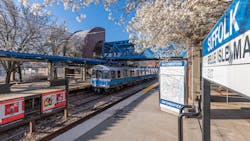FTA issues special directives for MBTA, Massachusetts DPU to take immediate action to address safety concerns
The Massachusetts Bay Transportation Authority (MBTA) and the Massachusetts Department of Public Utilities (DPU), the state agency responsible for safety oversight of the MBTA's rail transit operations, were issued a series of special directives by the Federal Transit Administration (FTA) requiring them to take immediate action to remedy safety concerns.
Four special directives were issued to the MBTA and one was issued to the DPU due to continuous safety violations and a failure to take urgent corrective actions. These directives follow several meetings conducted by FTA Administrator Nuria Fernandez in March 2022 with MBTA and DPU where Fernandez “discussed the need for the agencies to raise the bar on safety,” explained FTA Associate Administrator of Communications Paul Kincaid during a June 15 press conference. Four major incidents occurred following these meetings, leading FTA to begin a safety management inspection (SMI) on April 14, 2022, of the MBTA and the DPU.
While the FTA anticipates releasing its full report from the SMI on its findings and recommendations in August, FTA found several critical safety issues requiring immediate action. These issues include staffing at the Operating Control Center, general safety operating procedures, delayed maintenance and lapses in staff safety certifications.
Staffing levels at the operations control center are inadequate for the number of trains operating on the T. FTA found employees are working excessive hours—up to 20 hour shifts with only a four-hour window in between shifts, posing a significant risk to riders, train operators and other MBTA employees.
MBTA lacks adequate written procedures for safety processes and training that would prevent safety deficiencies. This translates to a lack of understanding of what’s required and a lack of general safety culture throughout the entire agency, creating opportunities for safety lapses. For example, FTA cited a recent incident where two MBTA trains broke loose in the maintenance yard, resulting in injuries to workers.
“The combination of inadequate procedures and staffing, and a safety culture where others look away when individuals do not follow basic safety rules creates circumstances that result in unacceptable and entirely avoidable incidents,” Kincaid said during the press conference.
The MBTA has been prioritizing train schedules over temporary shutdowns necessary to complete track and systems maintenance, creating a growing backlog of delayed critical maintenance. FTA found less than two hours are available each night to perform track maintenance for a system that has nearly 400 miles of track. Additionally, the only maintenance train for the entire Green Line has been out of service for eight months and there is no definitive timeline for its repair.
Lastly, numerous safety certifications for MBTA employees have expired. For example, at one point during FTA’s investigation, it found about 80 percent of heavy rail dispatchers’ safety certifications had lapsed.
“A lack of training is directly translating to numerous incidents of noncompliance with MBTA’s operating rules and procedures,” Kincaid said. “To that end, we’ll be ordering both the MBTA and DPU to address these critical safety deficiencies immediately.”
FTA will continue its SMI, adding that MBTA should remedy these safety issues concurrently. Each directive includes specific timeframes for MBTA to provide responses and take actions. A directive is also being issued to the DPU to ensure proper oversight of MBTA’s actions and responses to these safety issues.
While these safety concerns require immediate action, Kincaid iterated public transit remains the safest mode of transportation and riders shouldn’t avoid using the T because of these directives; rather, these directives will make the MBTA, as a whole, safer for riders and employees.
About the Author
Megan Perrero
Editor in Chief
Megan Perrero is a national award-winning B2B journalist and lover of all things transit. Currently, she is the Editor in Chief of Mass Transit magazine, where she develops and leads a multi-channel editorial strategy while reporting on the North American public transit industry.
Prior to her position with Mass Transit, Perrero was the senior communications and external relations specialist for the Shared-Use Mobility Center, where she was responsible for helping develop internal/external communications, plan the National Shared Mobility Summit and manage brand strategy and marketing campaigns.
Perrero serves as the board vice president for LIT and is a member of the American Public Transportation Association Marketing and Communications Committee. She holds a bachelor’s degree in multimedia journalism with a concentration in magazine writing and a minor in public relations from Columbia College Chicago.

